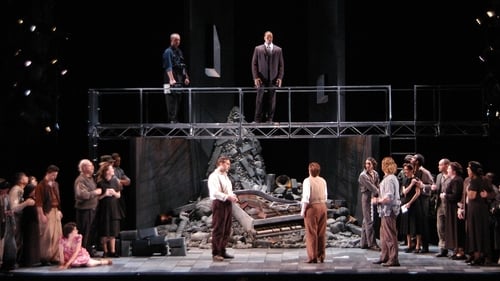
The Painter / African Prince
Alban Berg explores the power that Eros and Thanatos, in their rawest forms, have over our lives: Lulu, a femme fatale, will do anything to get ahead in a man’s world, but she ends up being destroyed.

To avoid serving his prison sentence, a fashionable socialite sneaks off to a lavish party. The champagne flows as guests waltz the night away, but several of them have something to hide. This internationally renowned production by Otto Schenk takes the audience on a bumpy ride through all kinds of intrigues, clothing mix-ups and mistaken identities, until we finally reach a rather hung-over happy ending. Conducted by Franz Welser-Möst and streamed on Strauss’ birthday, this performance is part of OperaVision’s events celebrating the inaugural World Opera Day on 25 October 2019.

Lurcanio
It is a work charged with jealousy and intrigue, with struggles and betrayal: Ariodante, Handel’s first work for the then brand new Theatre Royal in Covent Garden. At that time, the composer was faced with fierce competition, was financially stricken and on the rocks. However, he plucked up his courage while taking the waters and wrote the opera, basing it on Ariosto’s epic poem Orlando furioso. And he composed varied, colourful music, including the intimate aria “Scherza infida”, which is considered one of the special highlights of Handel’s oeuvre to this day.

Arbace
With this wonderful production, Mozart’s “Munich” opera returns to the place where it was first performed in 1781, the lovingly restored Cuvilliés Theatre, a veritable jewel of Rococo architecture. In Dieter Dorn’s production, the characters are real people of flesh and blood, their emotions and conflicts intelligible to every member of the audience. The cast includes some of the finest Mozart singers of our day, headed by the British tenor John Mark Ainsley in the title role, while Kent Nagano in the orchestra pit appears to unleash an elemental force of nature.

Graf Balduin Zedlau

Jaquino
Two years prior to the opening scene, the nobleman Florestan has exposed or attempted to expose certain crimes of the nobleman Pizarro. In revenge, Pizarro has secretly imprisoned Florestan in the prison over which Pizarro is governor. The jailer of the prison, Rocco, has a daughter, Marzelline, and a servant (or assistant), Jaquino. Florestan's wife, Leonore, came to Rocco's door dressed as a boy seeking employment, and Rocco hired her. On orders, Rocco has been giving Florestan diminishing rations until he is nearly starved to death. Place: A Spanish state prison, a few miles from Seville Time: Late 18th century

Belmonte
Singspiel in three acts by Wolfgang Amadeus Mozart. The German libretto is by Gottlieb Stephanie, based on Christoph Friedrich Bretzner's Belmont und Constanze, oder Die Entführung aus dem Serail. The plot concerns the attempt of the hero Belmonte, assisted by his servant Pedrillo, to rescue his beloved Konstanze from the seraglio of Pasha Selim. The work premiered on 16 July 1782 at the Vienna Burgtheater, with the composer conducting.

Ferrando
Mozart and Da Ponte use the theme of "fiancée swapping", which dates back to the 13th century; notable earlier versions are found in Boccaccio's Decameron and Shakespeare's play Cymbeline. Elements from Shakespeare's The Taming of the Shrew are also present. Furthermore, it incorporates elements of the myth of Procris as found in Ovid's Metamorphoses, vii.[10] Place: Naples Time: the 18th century






